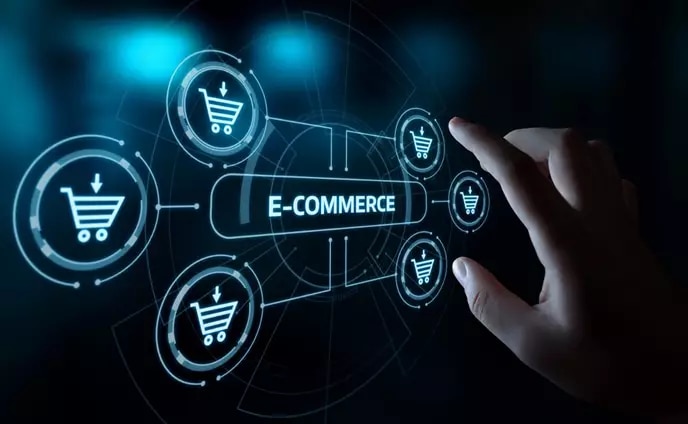The Future of E-Commerce: Innovations and Trends
By Eva Doger de Speville

In the digital era, commerce has changed immensely. The online market share in the UK was 26.5% in 2022 (from 10.6% in 2012). The rise in E-commerce has opened up a world of possibilities to businesses and consumers alike. Much of this can be attributed to trends such as artificial intelligence (AI), augmented reality (AR), social media, social responsibility, and convenience. Let’s explore some of the top innovations and trends that are defining the future of e-commerce.
- AI for Personalisation
- Voice Commerce
- Inclusivity
- AR Experiences
- Sustainability and Corporate Social Responsibility (CSR)
- Social Commerce
- Subscriptions
- Payment Innovations
- Mobile Commerce (m-commerce)
AI for Personalisation
This may seem like an oxymoron, but it all comes down to data. AI is transforming the e-commerce landscape by enhancing customer experience through personalisation, recommendation systems, and customer service. AI uses data to make data-driven decisions. Thanks to AI, companies can make personalised product recommendations based on customers’ previous interactions and purchases. They can also tailor discounts and offers. AI-powered chatbots can engage with users to help them make purchasing decisions. AI is also the face behind customised e-mail campaigns that follow up with customers post-purchase to keep them engaged.
Through this data-driven personalisation, AI enhances customer engagement, increases the likelihood of conversion, and fosters a sense of loyalty by showing that they understand the customer’s individual preferences and needs.
Voice Commerce
A great example of voice commerce is products like Amazon Alexa, Google Assistant, and Siri. A 2023 survey conducted in the UK found that 46% of respondents aged between 35 and 44 owned a smart speaker. Respondents aged between 45 and 54 recorded the highest share of speaker owners, 50%, followed closely by those between 25 and 34. With a combination of technology and convenience, it’s easier than ever to order something you may require with only a voice command. “Alexa, order more Nespresso pods from Amazon!”
Inclusive Commerce and Assistive Technology
Internet accessibility for disabled individuals is a critical aspect of ensuring that everyone, regardless of ability, can access and use the Internet effectively. Various laws, regulations, and guidelines are in place to promote digital accessibility and provide equal online opportunities for people with disabilities. Optimising your e-commerce website or application for accessibility ensures an enhanced user experience, expands the customer base, and more importantly, achieves equal access for all.
AI and machine learning (ML) enable more sophisticated accessibility features such as automatically generated image descriptions, voice-guided navigation, and enhanced screen reading capabilities. Integration of voice and gesture controls within e-commerce platforms allows customers with mobility impairments to navigate, browse, and make purchases using their voice or gestures, providing an accessible means of interaction.
AR Experiences
AR has enabled customers to experience shopping in a new way. Have you ever tried on sunglasses or makeup using AR? Not sure if that ottoman will suit your living room? With AR, you can now visualise how that will look in your space. AR is also used to give you a 360-degree view of the products. Looking to personalise your trainers? Companies like Nike and Adidas provide AR experiences so you know exactly what you’ll be getting.
Sustainability and Corporate Social Responsibility (CSR)
- 64% of Gen Z and Millennials (aged 18-29) in the UK want companies to take a stand on the social, cultural, environmental, and political issues close to their hearts.
- Over half (55%) of UK consumers say their purchasing consideration is driven by a company’s ethical values and authenticity.
According to Deloitte, consumers’ top five most important environmentally sustainable or ethical practices are producing sustainable packaging and products, reducing waste in the manufacturing process, committing to ethical working practices, reducing carbon footprint, and respect for human rights.
This reflects a large movement towards sustainability and CSR. Businesses have responded by joining sustainability initiatives (i.e. B Corp, 1% for the Planet, etc.), moving towards eco-friendly packaging, and responsible sourcing. To learn about implementing sustainability into business performance, bookmark this post.
Social Commerce
Social commerce is the process of selling products directly via social platforms such as Facebook, Instagram, or TikTok. With the popularity of social media and the power of influencer marketing, e-commerce is well-positioned for growth. Insider Intelligence expects the UK's social buyers to make up less than 25% of the nation's consumer market in 2023, even if over 80% now shop online. However, trends show that social commerce is becoming popular among younger consumers. FIS Global reported that 70% of millennials and 78% of Gen Zers in the UK buy directly on social channels.
Subscriptions
Subscription-based e-commerce is the future of convenience. Subscription-based services can vary from recurring product orders to curated subscriptions. For recurring product subscriptions, companies often offer special incentives or discounts for long-term commitments. Curated subscriptions offer personalisation catering to size, style, needs, etc., intended to match individual tastes and preferences. Subscription models provide convenience, predictability, flexibility, and options for consumers. For businesses, it offers retention and higher customer lifetime value.
On the tech side, subscription billing solutions have streamlined subscription logistics. Platforms like Stripe and Recurly provide subscription-based businesses with tools to manage recurring billing, invoices, and subscription plans efficiently.
Payment Innovations
Emerging payment technologies in e-commerce, including cryptocurrency acceptance, mobile wallets, and other innovative payment methods are transforming online transactions. Payment innovations trend towards consumer security. Digital and cryptocurrency acceptance offers a decentralised and secure alternative means of payment for online transactions. More popularly, mobile wallets such as Apple Pay or Google Pay, allow users to store payment information securely and conveniently. Other payment innovations include technology like “Buy Now, Pay Later” platforms such as Klarna and Afterpay, allowing customers to make purchases and pay for them in instalments.
Mobile Commerce (m-commerce)
During the second quarter of 2023, smartphones accounted for 75 percent of retail site visits in the UK and were used to make 70 percent of online shopping orders. As mobile usage has surged, responsive design, faster loading times, intuitive navigation, and seamless checkout have become integral contributors to the success of m-commerce.
The future of e-commerce is undeniably promising, with an exciting trajectory fueled by relentless innovation and evolving consumer demands. Innovation and trends in e-commerce are reshaping the landscape, enabling personalised, immersive, and secure shopping experiences. The rise of voice commerce, subscription-based models, and sustainable practices further underscore the dynamic shift towards convenience and eco-conscious choices. As the e-commerce industry continues to push boundaries, adaptability, and a customer-centric approach will be the pillars defining success. Embracing these innovations and staying ahead of trends will undoubtedly empower businesses to thrive in this rapidly evolving digital marketplace.
Contact Us
If you’ve got any questions call us +44 203 059 7800 or fill in your information below and we’ll get back to you shortly.





